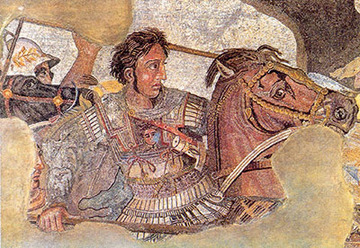Also known as:
Megas Alexandros, Μέγας Αλέξανδρος, Alexander Iii Of Macedon
More People of Greece
More Topic Categories
Related Destinations
Alexander the Great (20/07/-356 - 10/06/-323)
 Alexander the Great was king of the Macedon, Emperor General of the Panhellenic Coalition against the Persian Empire, successor to the Pharaohs of Egypt, and Lord of Asia and northwest India. His time marked the transition of the ancient world from the Classical Antiquity to the Hellenistic Era.
Alexander the Great was king of the Macedon, Emperor General of the Panhellenic Coalition against the Persian Empire, successor to the Pharaohs of Egypt, and Lord of Asia and northwest India. His time marked the transition of the ancient world from the Classical Antiquity to the Hellenistic Era.Born in Pella, Macedonia, in 356 BC, his parents were King Phillip II of Macedonia and princess Olympias of Epirus. According to tradition, it was during the night he was born that Herostratus set the Temple of Artemis in Ephesus ablaze and the magi of the city foretold Asia’s fall. Another legend mentioned by Plutarch says that before consummating her marriage, Olympias had a dream in which a thunderbolt struck her womb, while Phillip had a dream in which he sealed his wife’s womb with a lion-engraved seal.
His first tutor, Leonidas, a relative of Olympias, taught young Alexander arithmetic, geometry, music and horse riding. During this period, Alexander tamed the well-known Bucephalas, a horse that was sold to Phillip by a trader from Thessaly. His next tutor was Aristotle, who taught him medicine, philology, and political science, while the great philosopher largely influenced his way of thinking in general.
In 340 BC, Alexander completed his studies and after being anointed regent of Macedonia during his father’s absence, he managed to quell a Maedian revolt and establish a new city in their territory, called Alexandroupolis. In 338 BC, Alexander and his father marched against Athens and Thebes, culminating in the Battle of Chaeronia; after some careful tactical decisions, the Macedonians won the battle and marched unopposed all the way to Sparta. The Spartans refused entry to Phillip, but no war ensued.
Returning to Pella, his father married Cleopatra Eurydice; at the marriage, the bride’s uncle insulted Alexander, who responded accordingly. Phillip tried calming the two men, but a slip of his foot caused his fall, resulting in Alexander’s mocking comment, “Here’s the man who wants to step to Asia, yet cannot step from one end of the table to the other”. The young man fled with his mother to Epirus, but soon returned to his father, leaving his mother behind.
In 336 BC, Phillip was murdered by his commander, Pausanias, and Alexander swiftly neutralised all contenders to the throne and consolidated his power. Before starting on the conquest of the Persians that his father had planned, he safeguarded his borders by conquering the lands all the way to Danube. Meanwhile, the Thebans seized the opportunity to revolt, but Alexander and his army marched over 500 kilometres in just 12 days and besieged the city. Thebes fell and Alexander’s punishment was harsh; 6,000 Thebans were killed and the rest 30,000 were sold as slaves. The destruction was so vast that Alexander went on a pilgrimage to Delphi. After that, no other Greek city openly defied Alexander again.
In 334 BC, Alexander started his march against the Persians, invading from Hellespont. Although the Macedonian army was much smaller than what the vast Persian Empire could compile, Alexander depended on swiftness and courage. The main unit of his army was the Macedonian phalanx, equipped with sarisas, 6-meter long spears. Emerging victorious from the first Battle of the Granicus River, he conquered Sardis, the Ionian coast, and reaching Gordium, he solved the unsolvable Gordian knot, meaning he was destined to become the future king of Asia. During the Battle of Issus and Siege of Tyre, he crushed the army of Darius, who offered virtually unconditional surrender and lands as far as the Euphrates River. This resulted in neighbouring leaders abdicating power to Alexander. Advancing to Egypt, he was received as liberator, and founded Alexandria. Later, he chased Darius all the way to Parthia; Darius was eventually killed by a usurper. Alexander turned his gaze towards India, where he marched in 326 BC. However, his army mutinied and refused to go further, wanting to return home. Alexander finally accepted, but while in Babylon, he died in 323 BC.
There is a lot of controversy around his death, including assassination schemes, diseases and drug overdose. His sudden death caused shock waves across the empire, which was soon divided to four kingdoms, reigned by the so called Diadochi (Successors). The continuous clash among them finally resulted in the crumbling of the once mighty empire and its succession by the Romans.
See Also:
 Athens Photos
Athens Photos
 Santorini Photos
Santorini Photos
 Crete Photos
Crete Photos
 Meteora Photos
Meteora Photos
 Corfu Photos
Corfu Photos




